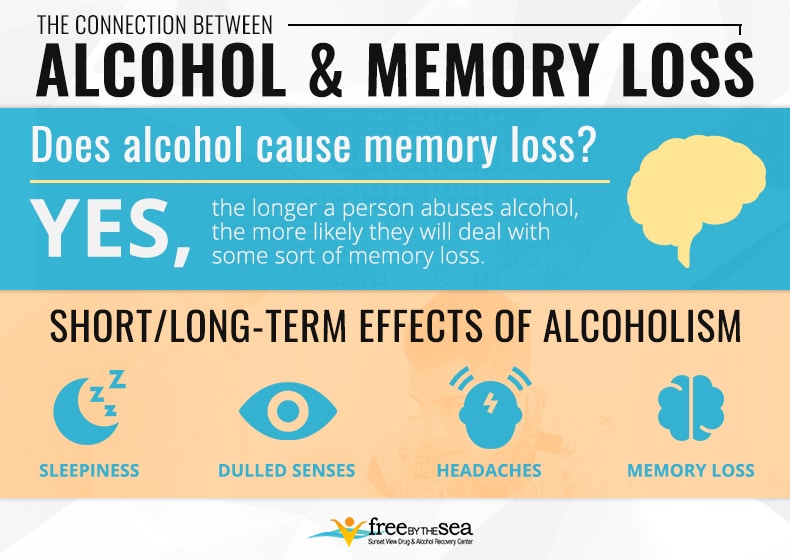Lots of research has indicated that heavy alcohol abuse can cause damage to memory, both in the short and long term. However, by cutting back on alcohol consumption and utilizing techniques to improve your memory, it’s possible to overcome any problems with alcohol and memory loss.
Alcohol affects the brain in two serious ways. The first is that alcohol is a sort of brain poison in higher amounts. The second is that heavy alcohol consumption is very often associated with low vitamin levels, which causes deterioration of the brain as well. This is why there is a strong connection between alcoholism and memory loss.
The effects that alcohol has on brain function are generally not as often discussed. This is due to the fact that the damage is slowly inflicted, and not immediately detectable. But it’s very important to recognize that excessive and consistent drinking can destroy brain tissue and lead to serious memory loss. The effects of alcohol on memory can be severe as time goes on.
Can Alcohol Affect Your Memory?
Jump to Section
Yes, alcohol and memory loss can be connected. The longer a person abuses alcohol, the more likely they will deal with some sort of memory loss. The heavier the alcohol use, the more likely and more extended the memory loss will be. This will include things like difficulty remembering what happened in the previous evening or even the whole night. Extended and excessive alcohol abuse can also lead to dementia, which is described as permanent memory loss.
Alcohol slows down the function of the brain that transfers information from your short-term memory to long-term memory storage. This is similar to someone sending you a package but during transit, the package is lost. Your long-term memory storage never receives the memory of the event. This is one of the many effects of alcohol on memory.

Will My Memory Improve if I Stop Drinking?
Yes, your memory will improve if you stop drinking alcohol. Often it’s not something that will occur overnight. Just as the damage did not occur after one night of drinking alcohol; one night of not drinking will not repair it. It can take roughly six months to a year before you see benefits and improvements in your memory.
Can Alcohol Permanently Damage Your Brain?
Yes, alcohol can permanently damage your brain. Research has determined that moderate to heavy drinking can cause permanent damage to your brain. This can range from simple memory lapses to more permanent damage that could require a lifetime of custodial care.
There are several factors that determine how much alcohol will ultimately damage your brain:
- How much alcohol a person consumes as well as how often
- When a person started drinking, and how much they continue to do so
- Demographic factors like age, education, gender, genetics, and family life
- If he or she had prenatal exposure to alcohol
- Overall health conditions
Over time, heavy alcohol abuse kills brain cells, can decrease the effectiveness of neurotransmitters, and causes nutritional deficiencies that further damage regular functioning.
What Are the Signs Alcohol is Affecting My Memory?
If you are dealing with memory lapses frequently after nights of drinking, this is an obvious indication. If you’re even asking this question, you probably suspect that alcohol is affecting your memory. Difficulty remembering events outside of drinking experiences would also indicate that you are starting to develop some more serious drinking consequences. Memory loss, or false memories can also be a sign of mental health truffles. Struggling to learn new things or remember important details like birthdays or anniversaries, can also be an indication.
Alcohol is often linked to memory problems and more intense long-term disorders like Korsakoff Syndrome. Korsakoff syndrome is caused by a deficiency of thiamine that is often brought on by heavy, and long-term alcohol abuse. This syndrome, as well as many alcohol and memory loss problems, are reversible. You have to stop drinking sooner, rather than later and work on a long-term plan for alcohol abuse recovery. Alcoholism and memory loss can be a problematic combination
What are the Short-Term Effects of Alcohol?
Alcohol intoxication decreases basic motor skills and may slightly increase euphoria.
Signs of intoxication include:
- Slow or a slurred speech
- Sleepiness
- Problems with coordination
- Distorted perceptions and dulled senses
- Headache
Continued alcohol consumption over time will eventually lead to alcohol tolerance. This means it will take more alcohol to feel the same effects. This is one of the beginning signs that lead to alcohol abuse and addiction.
Alcohol hangovers are also common in individuals that only drink in the short term. Alcohol is considered toxic to the body, the hangover is an indication that the body is working to rid itself of the toxic compound. Doctors typically advise that a person wait at least 48 hours before consuming alcohol again after a heavy drinking session.
What are Long-Term Effects of Alcohol?
Several risks include the development of chronic diseases such as long-term health complications such as liver disease, high blood pressure, heart disease, and cancer. Digestive problems and negative effects on the body’s nervous system can also occur.
Alcohol weakens your immune system and increases your chances of getting sick. It can also bring on mental health disorders like anxiety and depression. And as discussed earlier, moderate to heavy alcohol abuse can severely damage your brain. The effects of alcohol on memory are only just the beginning of how badly alcohol can deteriorate your body.
Alcohol and Memory Loss: Understand Blackouts
Alcoholic blackouts are generally described as gaps in the memory for things that occurred while they were heavily intoxicated. This occurs as the brain is trying to transfer memories from short-term to long-term storage in the hippocampus.
There are Two Types of Blackouts
The most common type is called a “fragmentary blackout”. This is described as having a spotty memory of events where you can recall certain “islands” of things that occurred, but not really in order, and not a complete timeline. Sometimes it’s also referred to as a “brownout” or a “gray out”. The second is complete amnesia or “en bloc”. This is characterized by a complete loss of memory for several hours. When this occurs, memories are never even formed and in most instances, can’t be recovered. Ultimately it’s like it never happened.
When Do Blackouts Happen?
Usually, a person has to drink a pretty high quantity of alcohol to reach the point of a blackout. In fact, blackouts usually start around 0.16 BAC (blood alcohol concentration) which is almost twice the legal limit. When someone has consumed this much alcohol most of their motor skills are seriously impaired.
There are some obvious impairments that occur only after a few drinks. So it makes sense that the more alcohol a person consumes, the more impaired they will ultimately become. Factors like lack of food, body size, and gender will also affect alcohol consumption and the rate of intoxication. Ultimately, blackouts happen when alcohol enters the bloodstream quickly. Someone drinking this fast will not usually realize how quickly the alcohol is taking effect. That’s why binge drinking is often linked to blackouts.

Alcohol and Memory Loss Could Be a Sign of a Bigger Problem
If you or someone you love is consistently dealing with alcohol and memory loss it may be a symptom of a bigger issue. Frequent blackouts or periods of memory loss can cause long-term brain damage as well as affect other aspects of a person’s body and overall quality of life. Alcohol abuse and addiction are often the cause of dealing with memory loss related to alcohol. Our team at Free by the Sea can find an alcohol addiction treatment plan for you or a loved one. We offer several programs and therapies that can help.
Residential Treatment for Alcohol Addiction
Residential treatment is often most beneficial for individuals suffering from severe alcoholism, typically marked by a long-standing history of heavy alcohol use. For those who do not have a strong family support system at home, residential treatment may be the best option. This approach often begins with a medical alcohol detox, ensuring a safe and supervised withdrawal while laying the foundation for long-term recovery.
Outpatient Treatment for Alcohol Addiction
There are a few different outpatient programs available to anyone seeking to find treatment and continue with their day-to-day responsibilities. Outpatient treatment allows therapy and other addiction recovery methods to occur around work, school, or home life. This is a great option if you or a loved one has a supportive family home that can help keep recovery on track.
Contact Free By the Sea to Learn More!
At Free by the Sea, we are here to help aid in your overall alcohol addiction recovery. Contact us today to learn about the many different programs and therapies we offer. Our treatment center works by offering individualized treatment to each person seeking addiction recovery. Alcohol addiction is difficult to overcome. Allow our addiction treatment specialists to help. You can overcome addiction, calling is the first step.

Dr. Richard Crabbe joined our team in 2019 as our psychiatrist and medical director. He attended the University of Ghana Medical School where he became a Medical Doctor in 1977. From 1978 through 1984, he was a medical officer in the Ghana Navy and provided a variety of services from general medicine to surgeries. He received his Certificate in General Psychology from the American Board of Psychology and Neurology in 2002.

 July 28th, 2021
July 28th, 2021










